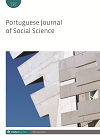
Full text loading...

Written in a reflexive, autoethnographic and essayistic mode, this article aims to provide an overview of the developments of LGBTQI+ rights in democratic Portugal and to identify the main frictions that affected and continue to affect them, while also providing glimpses of possible routes – in broad strokes – for making effective the changes in the life politics of LGBTQI+ people that are guaranteed in law.

Article metrics loading...

Full text loading...
References


Publication Date:
https://doi.org/10.1386/pjss_00037_1 Published content will be available immediately after check-out or when it is released in case of a pre-order. Please make sure to be logged in to see all available purchase options.